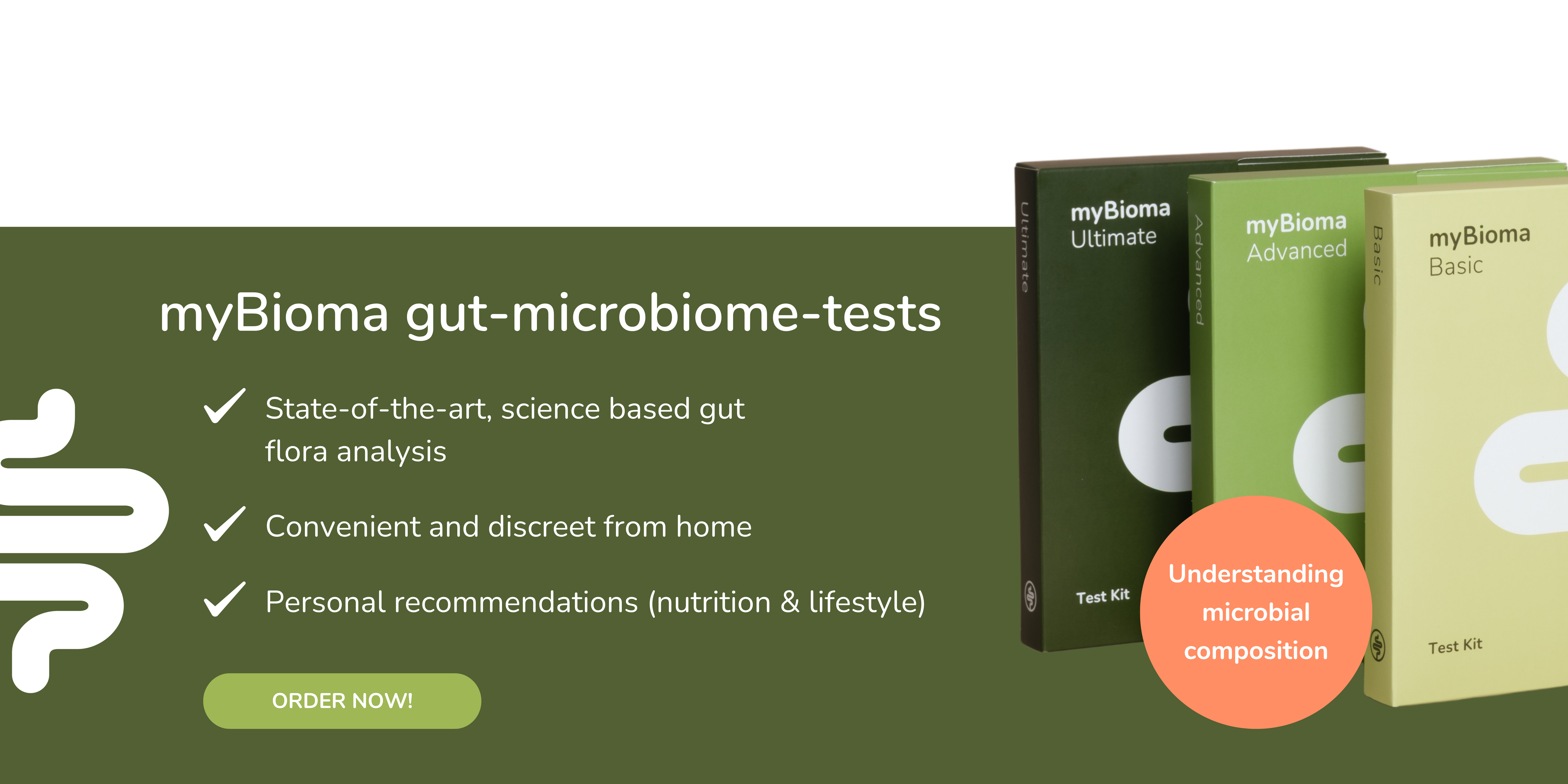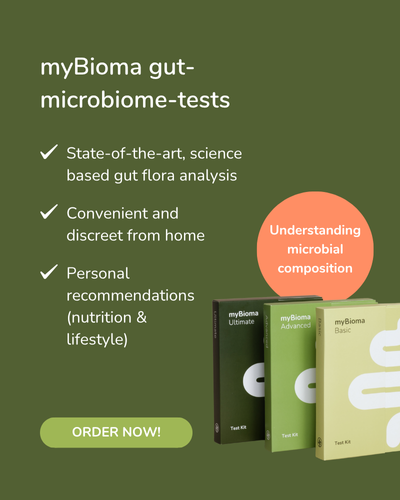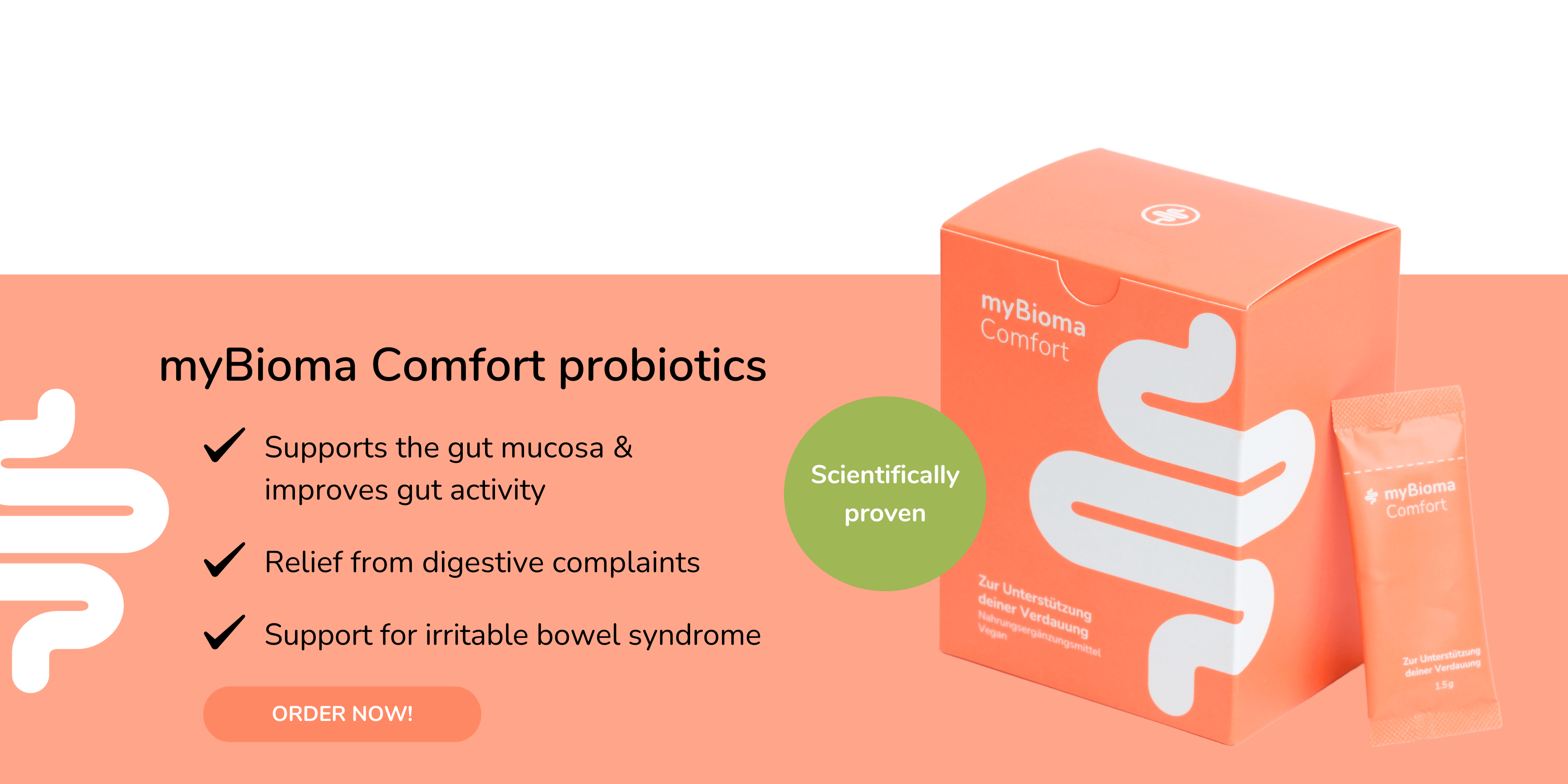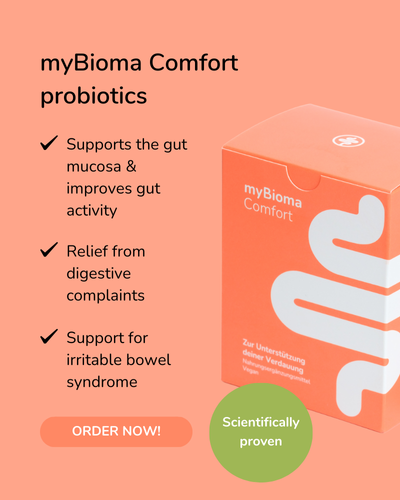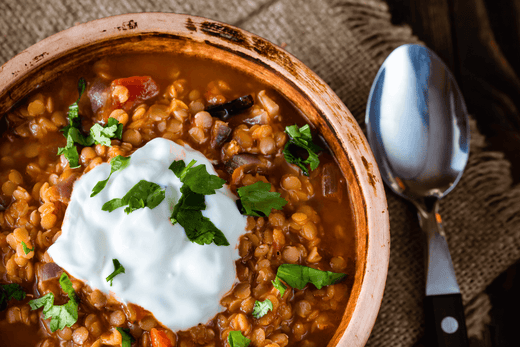Table of contents
- What are the causes of obesity?
- The connection between obesity and the gut microbiome
- The microbiome determines appetite
- Which intestinal bacteria combat obesity?
- What influence does diet have on weight and the intestinal microbiome?
- What influence does exercise have on our weight and the intestinal microbiome?
- Probiotics as a weight loss aid?
- Look at the matter holistically
Chronic diseases are increasing rapidly worldwide, with obesity, which means being overweight, being one of the main causes (1). Although there are a variety of methods that attempt to prevent the ever-increasing weight gain, obesity remains a widespread problem. New solutions urgently need to be developed. The diseases associated with obesity such as cardiovascular disease, diabetes and cancer are among the leading causes of death, so researchers are striving to find new efficient treatments for these diseases (2).
What are the causes of obesity?
A high-calorie diet is a causal factor for obesity and can also lead to changes in the gut microbiome (3). In addition to dietary, lifestyle and genetic factors, it is believed that overweight or obesity can also result from a disruption of the gut microbiome, as an imbalance in the gut, also known as dysbiosis, affects metabolic function and the balance between food intake and energy expenditure (3).
The connection between obesity and the gut microbiome
Or rather: can a disturbed gut flora lead to obesity? It is well known that the gut microbiome has a huge impact on overall health and well-being. The bacteria in the gut influence the absorption, breakdown and storage of nutrients and have potential effects on physiology (1). In addition to high calorie intake, overuse of antibiotics has also been linked to the incidence of obesity (4). An imbalance of the gut microbiome can promote the growth of harmful organisms that can lead to overweight or obesity as well as cause chronic inflammation and thus plays an important role in the prevention of chronic metabolic and intestinal diseases. (5). A balanced gut microbiome, on the other hand, is considered an important factor in the prevention or alleviation of obesity and metabolic diseases (6). The proliferation of beneficial bacteria and the simultaneous reduction of harmful bacteria can therefore contribute to better health and well-being (7).
By the way, you can with that myBioma microbiome analysis You can easily determine from home whether your intestinal microbiome is in balance or whether there is dysbiosis. Based on your results, you will receive scientifically based nutritional recommendations.
The microbiome determines appetite
The intestine is now also referred to as the “ second brain ” because the microorganisms living there communicate directly with the brain and thus influence brain signals that are responsible for stimulating hunger and appetite (8).
Which intestinal bacteria combat obesity?
Most studies have found that the ratio of Firmicutes to Bacteroidetes is significantly higher in obese individuals (7). In addition, a study was conducted to examine the differences in the gut microbiome between obese and non-obese Japanese subjects. Obese subjects had significantly reduced numbers of Bacteroidetes and a higher ratio of Firmicutes to Bacteroidetes compared to non-obese subjects. The diversity of bacteria was also lower in the obese subjects than in the non-obese subjects (9).
A study of obese and lean Chinese college students found a negative correlation between BMI and diversity. Obese male subjects had a less diverse microbiome than people in the lean group. Furthermore, the microbiome composition in lean men was more complex and had a higher ratio of Bacteroides to Firmicutes.
What influence does diet have on weight and the intestinal microbiome?
Different diets have different influences on the composition and diversity of the intestinal microbiome (10). The typical Western diet, which consists of the consumption of highly processed foods, a high intake of saturated fatty acids and sugar, and a low intake of vegetables, fruit and fiber (11), unbalances the intestinal microbiome (12). .
Studies have shown that African children who eat a low-fat, high-fiber diet have higher diversity and fewer disease-causing bacteria. These children also have larger amounts of Bacteroidetes than European children, who have larger amounts of Firmicutes and Enterobacteriaceae ( 13 ).
In contrast, a high-fat, low-fiber diet has been shown to reduce gut microbial diversity and decrease gut bacteria that produce valuable SCFAs (short-chain fatty acids) (14, 15). Intake of high-fiber foods (e.g., fruits, vegetables, and legumes) increased microbial diversity (14, 16) and was associated with reduced weight gain in humans, independent of caloric intake (17).
Additionally, astaxanthin, one of the most powerful antioxidants, and the medicinal mushroom Antrodia cinnamomea have been shown to improve the gut microbiome in obese mice caused by a high-fat diet. Both prevented weight gain, improved fat and sugar metabolism, and regulated the balance of the gut microbiome (18, 19) by optimizing the ratio of Bacteroides to Firmicutes and improving Akkermansia (19).
What influence does exercise have on our weight and the intestinal microbiome?
Sports activities have a positive influence on the intestinal microbiome. They promote microbial diversity and also the proliferation of butyrate-producing intestinal bacteria (20). One study compared changes in gut microbial diversity and composition in young adults who engage in moderate to vigorous physical activity. The study found an increase in microbial diversity, particularly in participants who also ate an adequate amount of fiber per day (21). Furthermore, an increase in Bacteroidetes and a decrease in Firmicutes have been reported in obese adults following aerobic moderate-to-vigorous physical activity (22). This suggests that both exercise and a diet rich in dietary fiber have a positive effect on our “slimming bacteria”.
You can find out more about the connection between exercise and intestinal health in our article: How are the microbiome and exercise related? experience.
Probiotics as a weight loss aid?
When used correctly, probiotics can help to improve the composition of the intestinal flora. From this point of view, taking probiotics can help to reduce the risk of obesity. However, taking probiotics should not be seen as a miracle cure that magically solves all problems. It is more important to focus on a healthy lifestyle and the right diet.
Look at the matter holistically
Finally, several factors influence the diversity and composition of the gut microbiome and can lead to an imbalance that is associated with weight gain and obesity. In particular, diet, physical activity, dietary supplements and medications influence the intestinal microbiome. The influence of the gut microbiome on metabolism, hormonal balance and the brain may play an important role in weight control and the treatment of obesity.
We are already looking forward to further studies. Did you know that you can feed the right bacteria in your intestines and therefore multiply them? Try this recipe: Lentil and vegetable stew: Food for your slimming bacteria . You can also find even more simple and tasty recipes to optimally support your microbiome in the myBioma eBook: Microbiome food – recipes for your slimming bacteria .
References
- Gentile CL, Weir TL. The gut microbiota at the intersection of diet and human health. Science. 2018 Nov 16;362(6416):776-780. doi: 10.1126/science.aau5812. PMID: 30442802.
- Wilkins LJ, Monga M, Miller AW. Defining Dysbiosis for a Cluster of Chronic Diseases. Sci Rep. 2019 Sep 9;9(1):12918. doi: 10.1038/s41598-019-49452-y. PMID: 31501492; PMCID: PMC6733864.
- Guirro M, Costa A, Gual-Grau A, Herrero P, Torrell H, Canela N, Arola L. Effects from diet-induced gut microbiota dysbiosis and obesity can be ameliorated by fecal microbiota transplantation: A multiomics approach. PLoS One. 2019 Sep 23;14(9):e0218143. doi: 10.1371/journal.pone.0218143. PMID: 31545802; PMCID: PMC6756520.
- Podolsky SH. Historical Perspective on the Rise and Fall and Rise of Antibiotics and Human Weight Gain. Ann Intern Med. 2017 Jan 17;166(2):133-138. doi: 10.7326/M16-1855. PMID: 28114473.
- Turroni F, Ventura M, Buttó LF, Duranti S, O’Toole PW, Motherway MO, van Sinderen D. Molecular dialogue between the human gut microbiota and the host: a Lactobacillus and Bifidobacterium perspective. Cell Mol Life Sci. 2014 Jan;71(2):183-203. doi: 10.1007/s00018-013-1318-0. Epub 2013 Mar 21. PMID: 23516017.
- John GK, Mullin GE. The Gut Microbiome and Obesity. Curr Oncol Rep. 2016 Jul;18(7):45. doi: 10.1007/s11912-016-0528-7. PMID: 27255389.
- Fischer N, Relman DA. Clostridium difficile, Aging, and the Gut: Can Microbiome Rejuvenation Keep Us Young and Healthy? J Infect Dis. 2018 Jan 4;217(2):174-176. doi: 10.1093/infdis/jix417. PMID: 28968708; PMCID: PMC5853914.
- Lankelma JM, Nieuwdorp M, de Vos WM, Wiersinga WJ. The gut microbiota in internal medicine: implications for health and disease. Neth J Med. 2015 Feb;73(2):61-8. PMID: 25753070.
- Kasai C, Sugimoto K, Moritani I, Tanaka J, Oya Y, Inoue H, Tameda M, Shiraki K, Ito M, Takei Y, Takase K. Comparison of the gut microbiota composition between obese and non-obese individuals in a Japanese population, as analyzed by terminal restriction fragment length polymorphism and next-generation sequencing. BMC Gastroenterol. 2015 Aug 11;15:100. doi: 10.1186/s12876-015-0330-2. PMID: 26261039; PMCID: PMC4531509.
- Oriach CS, Robertson RC, Stanton C, Cryan JF, Dinan TG. Food for thought: the role of nutrition in the microbiota-gut-brain axis. Clin Nutr Exp. 2016;6:25–38. doi: 10.1016/j.yclnex.2016.01.003.
- Zinöcker M.K., Lindseth I.A. The Western diet–microbiome-host interaction and its role in metabolic disease. Nutrients. 2018;1010:365.
- Noble EE, Hsu TM, Kanoski SE. Gut to Brain Dysbiosis: Mechanisms Linking Western Diet Consumption, the Microbiome, and Cognitive Impairment. Front Behav Neurosci. 2017 Jan 30;11:9. doi: 10.3389/fnbeh.2017.00009. PMID: 28194099; PMCID: PMC5277010.
- De Filippo C, Cavalieri D, Di Paola M, Ramazzotti M, Poullet JB, Massart S, Collini S, Pieraccini G, Lionetti P. Impact of diet in shaping gut microbiota revealed by a comparative study in children from Europe and rural Africa. Proc Natl Acad Sci U S A. 2010 Aug 17;107(33):14691-6. doi: 10.1073/pnas.1005963107. Epub 2010 Aug 2. PMID: 20679230; PMCID: PMC2930426.
- Simpson HL, Campbell BJ. Review article: dietary fibre-microbiota interactions. Aliment Pharmacol Ther. 2015;42:158–179. doi: 10.1111/apt.13248.
- Agus A, Denizot J, Thévenot J, Martinez-Medina M, Massier S, Sauvanet P, Bernalier-Donadille A, Denis S, Hofman P, Bonnet R, Billard E, Barnich N. Western diet induces a shift in microbiota composition enhancing susceptibility to Adherent-Invasive E. coli infection and intestinal inflammation. Sci Rep. 2016 Jan 8;6:19032. doi: 10.1038/srep19032. PMID: 26742586; PMCID: PMC4705701.
- Zhang N, Ju Z, Zuo T. Time for food: The impact of diet on gut microbiota and human health. Nutrition. 2018 Jul-Aug;51-52:80-85. doi: 10.1016/j.nut.2017.12.005. Epub 2018 Feb 5. PMID: 29621737.
- Menni C, Jackson MA, Pallister T, Steves CJ, Spector TD, Valdes AM. Gut microbiome diversity and high-fibre intake are related to lower long-term weight gain. Int J Obes (Lond). 2017 Jul;41(7):1099-1105. doi: 10.1038/ijo.2017.66. Epub 2017 Mar 13. PMID: 28286339; PMCID: PMC5500185.
- Chang CJ, Lu CC, Lin CS, Martel J, Ko YF, Ojcius DM, Wu TR, Tsai YH, Yeh TS, Lu JJ, Lai HC, Young JD. Antrodia cinnamomea reduces obesity and modulates the gut microbiota in high-fat diet-fed mice. Int J Obes (Lond). 2018 Feb;42(2):231-243. doi: 10.1038/ijo.2017.149. Epub 2017 Jun 20. PMID: 28630461; PMCID: PMC5803574.
- Wang J, Liu S, Wang H, Xiao S, Li C, Li Y, Liu B. Xanthophyllomyces dendrorhous-Derived Astaxanthin Regulates Lipid Metabolism and Gut Microbiota in Obese Mice Induced by A High-Fat Diet. Mar Drugs. 2019 Jun 5;17(6):337. doi: 10.3390/md17060337. PMID: 31195737; PMCID: PMC6627754.
- Allen JM, Mailing LJ, Niemiro GM, Moore R, Cook MD, White BA, Holscher HD, Woods JA. Exercise Alters Gut Microbiota Composition and Function in Lean and Obese Humans. Med Sci Sports Exerc. 2018 Apr;50(4):747-757. doi: 10.1249/MSS.0000000000001495. PMID: 29166320.
- Whisner CM, Maldonado J, Dente B, Krajmalnik-Brown R, Bruening M. Diet, physical activity and screen time but not body mass index are associated with the gut microbiome of a diverse cohort of college students living in university housing: a cross-sectional study. BMC Microbiol. 2018 Dec 12;18(1):210. doi: 10.1186/s12866-018-1362-x. PMID: 30541450; PMCID: PMC6291939.
- Santacruz A, Marcos A, Wärnberg J, Martí A, Martin-Matillas M, Campoy C, et al. Interplay between weight loss and gut microbiota composition in overweight adolescents. Obesity. 2009;17:1906–1915. doi: 10.1038/oby.2009.112.



